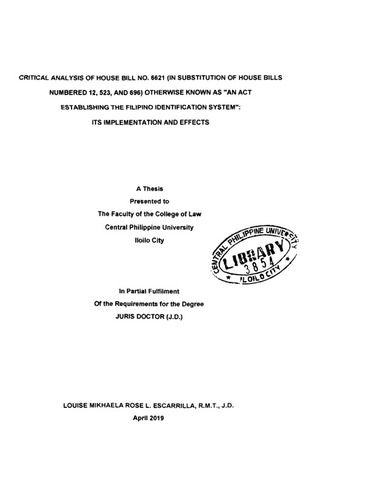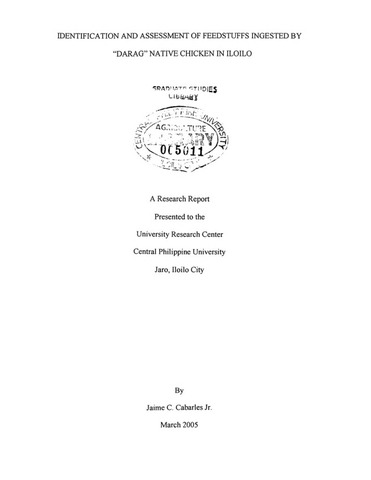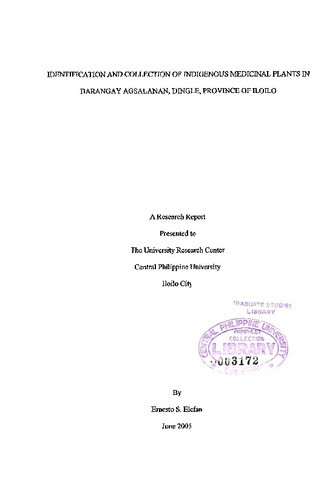Показать сокращенную информацию
Critical analysis of House Bill No. 6621 (in substitution of House Bills Numbered 12, 523, and 696) otherwise known as “ an Act Establishing the Filipino Identification System” : Its implementation and effects
| dc.contributor.adviser | Alibogha, Salex E. | |
| dc.contributor.author | Escarrilla, Louise Mikhaela Rose L. | |
| dc.date.accessioned | 2021-06-29T02:57:23Z | |
| dc.date.available | 2021-06-29T02:57:23Z | |
| dc.date.issued | 2019 | |
| dc.identifier.citation | Escarrilla, L. M. R. L. (2019). Critical analysis of House Bill No. 6621 (in substitution of House Bills Numbered 12, 523, and 696) otherwise known as “ an Act Establishing the Filipino Identification System” : Its implementation and effects (Unpublished postgraduate thesis). Central Philippine University, Jaro, Iloilo City. | en_US |
| dc.identifier.uri | https://hdl.handle.net/20.500.12852/1112 | |
| dc.description | Abstract only | en_US |
| dc.description.abstract | This study reviewed and analyzed House Bill No. 6621 otherwise known as An Act Establishing the Filipino Identification System. The national ID system has been a very controversial issue in the past decades with experts warning that it could violate a person's right to privacy. But government insists that security mechanisms are in place to protect stored information. There are several legislations passed by lawmakers one of which is the House Bill No. 6621 which is a consolidation of 3 different proposal of different lawmakers who believes that National ID system will simplify public and private transactions. Qualitative research method was used in this study where the vague and ambiguous provisions of the House Bill were identified as indicators of this study. The National Identification System aims to lower costs, streamline transactions, and provide ease and convenience. It further provides the official identification of the all citizens of the Republic of the Philippines and gradually concert and consolidate into one all existing government-initiated identification systems into one integrated and efficient identification system. Despite the numerous IDs issued by the government, 14 percent of Filipinos are still denied of government and financial services due to lack of proper identification documents. Recently, the President of the Philippines signed the bill creating the Philippine Identification System (PhilSys) which is the government’s central identification platform. | en_US |
| dc.format.extent | vi, 40 leaves | en_US |
| dc.language.iso | en | en_US |
| dc.rights | Attribution-NonCommercial-NoDerivs 3.0 Philippines | * |
| dc.rights.uri | http://creativecommons.org/licenses/by-nc-nd/3.0/ph/ | * |
| dc.subject.ddc | Law Library 340.72 Es14 2019 | en_US |
| dc.subject.lcsh | Identification | en_US |
| dc.subject.lcsh | Identification cards | en_US |
| dc.subject.lcsh | Identification cards--Law and legislation | en_US |
| dc.subject.lcsh | Identification--Law and legislation | en_US |
| dc.title | Critical analysis of House Bill No. 6621 (in substitution of House Bills Numbered 12, 523, and 696) otherwise known as “ an Act Establishing the Filipino Identification System” : Its implementation and effects | en_US |
| dc.type | Thesis | en_US |
| dc.description.bibliographicalreferences | Includes bibliographical references | en_US |
| dc.contributor.chair | Bedona, Zacarias D. Jr. | |
| dc.contributor.department | College of Law | en_US |
| dc.description.degree | Juris Doctor | en_US |
| local.subject | RA 11055 | en_US |
| local.subject | Philippine Identification System Act | en_US |
| local.subject | Filipino Identification System | en_US |
| local.subject | HB 6621 s. 2016 | en_US |
| local.subject | Philippine Identification System (PhilSys) | en_US |
Файлы в этом документе
Данный элемент включен в следующие коллекции
-
Juris Doctor [144]






